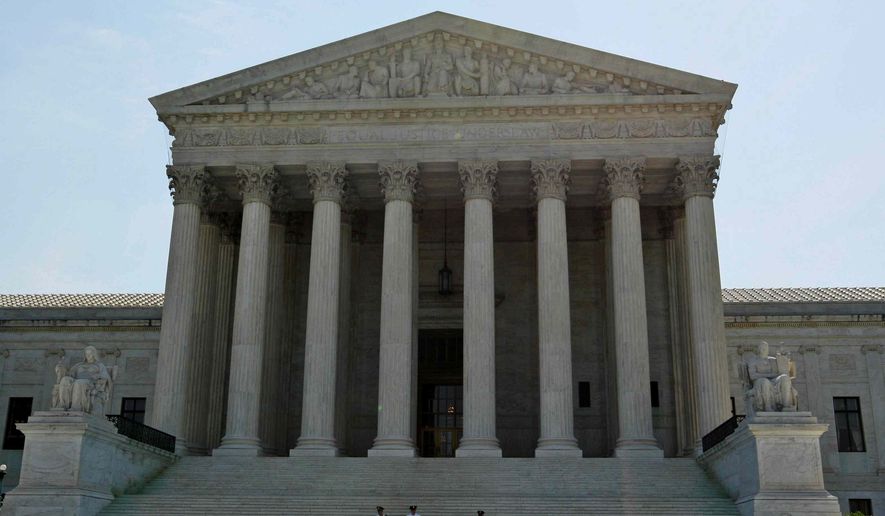This year’s showdown on same-sex marriage was set Friday as the Supreme Court agreed to review an appellate court ruling that affects marriage laws in four states.
The high court’s decision will reverberate nationally as it will clarify whether states — and their voters — have the right to set their own rules on a domestic policy like marriage, or whether, as gay marriage advocates contend, the U.S. Constitution contains a right to marriage equality for same-sex couples.
In its Friday order, the Supreme Court asked that two questions be answered: Does the 14th Amendment require a state to license a marriage between two people of the same sex, and does it require a state to recognize a same-sex union that was legalized elsewhere.
The first round of briefs from gay marriage supporters are due on Feb. 27, with counter arguments from states due on March 27, the high court said in its order.
The high court could set a date for oral arguments by late April and have enough time to issue a ruling by late June, said court observers.
Advocates for and against same-sex marriage cheered Friday’s announcement that the high court will review the 6th U.S. Circuit Court of Appeals ruling in the Michigan gay marriage case, DeBoer v. Snyder, plus similar cases in Ohio, Tennessee and Kentucky.
“This is a very sweet moment,” said Leslie Gabel-Brett, director of education and public affairs at Lambda Legal, one of four major gay rights groups that have argued in the lawsuits at the heart of the review.
The high court “now has the opportunity to end the injustice facing same-sex couples who are recognized, protected and respected in more than 36 states, but excluded from marriage rights in the end of the country,” said Kate Kendell, executive director of National Center for Lesbian Rights.
“This is the moment we’ve long been working toward,” said Evan Wolfson, president of Freedom to Marry.
He urged gay marriage supporters to keep doing the work that “maximizes our chances of winning,” so that when the nine justices deliberate, “they must know that America is ready for the freedom to marry, and that no family and no state should be left out.”
Opponents of same-sex marriage also applauded the decision to take up the 6th Circuit ruling.
“The people of every state should remain free to affirm marriage as the union of a man and a woman in their laws,” said Austin R. Nimocks, senior counsel with Alliance Defending Freedom.
The 6th Circuit’s ruling is consistent with the Supreme Court’s 2013 Windsor decision, which said “states have the essential authority to define the marital relation,” and the Constitution “does not demand that a new view of marriage be judicially imposed on everyone,” he said. “We are hopeful the Supreme Court will uphold the freedom of the people to affirm marriage.”
Some 50 million Americans in 30 states voted to define marriage as a man-woman union, and it is time for them “to have their day in court,” said Brian S. Brown, president of the National Organization for Marriage.
“We are confident that the Supreme Court has chosen the 6th Circuit case in order to affirm the finding of the Appeals court, just as it did in the cases of Windsor v. United States and Sebelius v. Hobby Lobby,” said Mr. Brown.
“Lower court judges have robbed millions of people of their voice and vote on society’s most fundamental relationship — marriage,” said Tony Perkins, president of the Family Research Council.
The Supreme Court now has the opportunity to “restore the freedom of the people to uphold marriage in their state laws as the union of a man and a woman.”
The gay marriage issue has roiled the nation since the early 1990s, when Hawaii judges upheld gay couples’ right to marry. After the Supreme Court’s 2013 Windsor ruling, which that struck down a key part of the federal Defense of Marriage Act, every state that didn’t have gay marriage was taken to court by gay plaintiffs seeking to marry.
Today, some 36 states and the District permit same-sex marriage. In some cases, the laws were changed by the vote of the people or with legislative approval, but most were done via judicial fiat.
Camilla Taylor, a senior attorney at Lambda Legal, said Friday that the marriage-equality journey to the Supreme Court has come after tremendous collaboration of countless groups and individuals working for that common goal.
Especially in the last few years, she said Friday, “it’s been all hands on deck.”
It’s also gratifying that Attorney General Eric Holder has already announced that the Department of Justice will file a friend-of-the-court brief in support of the gay plaintiffs, said Jon Davidson, legal director of Lambda Legal.
“We certainly are very hopeful that we will win” on both questions, said Mr. Davidson. If the Supreme Court decided not to rule in favor of gay marriage, he added, there’s “no question, it would be quite a mess.”
• Cheryl Wetzstein can be reached at cwetzstein@washingtontimes.com.




Please read our comment policy before commenting.